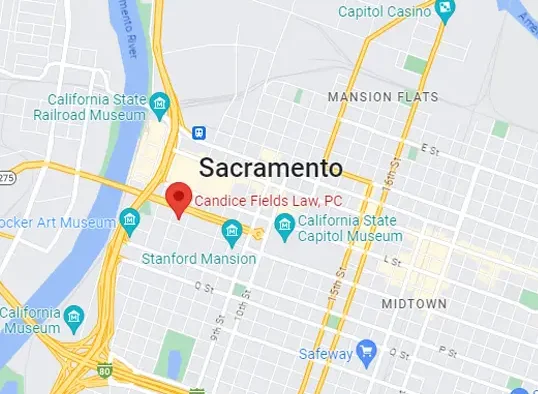Federal Criminal Case Process
Understanding the federal criminal case process can be overwhelming. At Candice Fields Law, PC, we guide clients through each stage of federal criminal proceedings, ensuring they have the knowledge and support needed to navigate this complex system effectively.
Need legal assistance?
What Constitutes a Federal Criminal Case?
Federal criminal cases differ from state prosecutions in both scope and jurisdiction. The following list outlines common scenarios that fall under federal jurisdiction, particularly focusing on white-collar and regulatory violations:
- Securities Fraud: Deceptive practices involving stocks, bonds, or other investment instruments, including insider trading and Ponzi schemes
- Mail and Wire Fraud: Using postal services or electronic communications to execute fraudulent schemes or transmit false information across state lines
- Environmental Violations: Breaking EPA regulations, including illegal disposal of hazardous waste, violations of the Clean Water Act, or unauthorized wildlife trafficking
- Tax Evasion: Willful attempts to defeat or evade federal tax obligations, including hiding income, filing false returns, or using offshore accounts improperly
- Bank Fraud: Schemes to defraud financial institutions or obtain money through false pretenses, including check kiting or mortgage fraud
- Healthcare Fraud: Submitting false claims to Medicare or Medicaid, kickback schemes, or billing for services not rendered
- Wildlife and Conservation Violations: Breaking federal conservation laws, including illegal hunting on federal lands, violating endangered species protections, or trafficking protected species
- Import/Export Violations: Breaking customs laws, violating international trade regulations, or falsifying import/export documentation
- Conspiracy: Agreement between two or more people to commit any federal crime, even if the planned crime is not completed
- Money Laundering: Concealing the source of illegally obtained money through complex financial transactions or legitimate businesses
- Federal Computer Crimes: Unauthorized access to protected computer systems, cyber espionage, or interstate transmission of fraudulent data
- Endangered Species Act Violations: Taking, possessing, or trading protected species without proper permits or documentation
- RICO Violations: Pattern of racketeering activity involving multiple related crimes over an extended period
Our law firm has extensive experience defending clients against these and other federal charges. Each case type requires thorough understanding of specific federal statutes, regulations, and precedents. Early intervention is crucial for building an effective defense strategy.
Remember: Federal investigations often begin long before charges are filed. If you suspect you're under investigation for any of these offenses, seeking immediate legal counsel is essential for protecting your rights and interests.
Stages of a Federal Criminal Case

The federal criminal case process typically begins with an investigation by federal agencies such as the FBI, DEA, or IRS. These investigations can last months or even years before any formal charges are filed. During this crucial period, having a federal criminal defense lawyer can make a significant difference in protecting your rights and potentially influencing the direction of the investigation.
Investigation and Pre-Charging Phase
The investigation and pre-charging phase is a critical period in any federal criminal case. During this time, federal agencies gather evidence and build their case, often without the target's knowledge. Understanding these key components can help protect your rights:
- Grand Jury Subpoenas: Federal prosecutors use these powerful tools to compel document production and witness testimony, often revealing the first signs of an investigation
- Target Letters: The Department of Justice sends these formal notifications to inform individuals they are subjects of federal investigation, requiring immediate legal response
- Search Warrants: Federal agents may execute warrants to search homes, offices, or electronic devices, often arriving unannounced at early morning hours
- Witness Interviews: Federal agents conduct interviews with employees, associates, or other potential witnesses, seeking information about suspicious activities
- Electronic Surveillance: Investigators may monitor phone calls, emails, or other communications through court-authorized wiretaps or digital surveillance
- Financial Analysis: Federal agencies trace money flows, examine bank records, and analyze suspicious transactions to establish patterns of conduct
- Cooperating Witnesses: Investigators often work with insider informants who provide detailed information about alleged criminal activities in exchange for leniency
- Document Review: Federal agents collect and analyze vast amounts of business records, tax returns, emails, and other documentation to build their case
- Parallel Proceedings: Multiple agencies may conduct simultaneous civil and criminal investigations, sharing information and resources
- Pre-Indictment Negotiations: Defense attorneys may engage with prosecutors to present exculpatory evidence or negotiate potential resolutions before charges are filed
Early intervention during this phase can significantly impact the direction and outcome of a federal investigation. At Candice Fields Law, PC, we work to protect clients' interests from the moment we become aware of federal investigative activity, often preventing charges from being filed or minimizing their severity.
Remember: What you do during the investigation phase can greatly influence the final outcome of your case. Contact our firm immediately if you suspect you're under federal investigation - the sooner we get involved, the more options we have to protect your interests.
Formal Charges and Arraignment
The formal charges and arraignment stage marks a critical transition from investigation to active prosecution in a federal criminal case. This phase establishes the official charges and sets the foundation for your defense:
- Criminal Complaint Filing: Prosecutors present a sworn statement to a magistrate judge detailing probable cause for federal charges, often leading to arrest warrants
- Grand Jury Indictment: A federal grand jury reviews evidence presented by prosecutors and votes to issue formal charges, typically without defense representation present
- Information Filing: In some cases, prosecutors file charges directly through an information document, but this requires the defendant's consent to waive grand jury proceedings
- Initial Appearance: The first court hearing where defendants learn their constitutional rights, receive preliminary bail conditions, and get appointed counsel if needed
- Detention Hearing: A separate hearing determines whether the defendant will be released pending trial, considering factors like flight risk and community safety
- Arraignment Procedure: Defendants appear before a federal judge to hear formal charges, enter an initial plea, and receive important court dates
- Bail Conditions: The court sets specific release conditions, which may include travel restrictions, surrender of passport, electronic monitoring, or regular reporting
- Discovery Timeline: The judge establishes deadlines for the government to provide evidence and discovery materials to the defense team
- Preliminary Hearing: In cases beginning with a complaint, the court holds a hearing to determine if probable cause exists, unless an indictment has been returned
- Joint Defense Agreements: In multi-defendant cases, separate defense teams may establish formal agreements to share information and coordinate strategy
At Candice Fields Law, PC, we carefully analyze charging documents, scrutinize probable cause determinations, and advocate for favorable bail conditions. We ensure our clients understand each aspect of these proceedings and their implications for the case ahead.
Remember: Decisions made during the charging and arraignment phase can impact your entire case. Our firm provides strategic guidance to protect your rights and position your defense for the best possible outcome.
Pre-Trial Phase
The pre-trial phase in federal criminal cases involves extensive preparation, strategic decision-making, and critical legal maneuvers. This period often determines the ultimate outcome of your case:
- Discovery Review: Defense teams analyze government evidence, including witness statements, surveillance materials, financial records, and electronic communications to identify strengths and weaknesses
- Motion Practice: Attorneys file strategic motions challenging evidence, seeking dismissal, requesting specific disclosures, or addressing constitutional violations in the government's case
- Brady Material: Prosecutors must disclose any evidence favorable to the defense, including information that could impeach government witnesses or support innocence
- Witness Interviews: Defense teams conduct independent investigations, interviewing potential witnesses and gathering evidence to support defense theories
- Evidence Analysis: Independent experts examine forensic evidence, financial records, or digital data to challenge government conclusions or support alternative explanations
- Plea Negotiations: Defense counsel engages in discussions with prosecutors about potential plea agreements, seeking the most favorable terms possible
- Suppression Strategy: Attorneys challenge evidence obtained through potentially illegal searches, interrogations, or surveillance, seeking to exclude it from trial
- Pretrial Conferences: Regular court appearances address administrative matters, schedule issues, and resolution of pending motions
- Defense Investigation: Private investigators gather additional evidence, locate witnesses, and develop information supporting defense theories
- Expert Consultation: Defense teams work with subject matter authorities in areas like accounting, technology, or industry practices to strengthen defense positions
- Trial Preparation: If plea negotiations fail, attorneys develop trial strategies, prepare exhibits, and outline examination approaches for witnesses
At Candice Fields Law, PC, we invest significant resources in pre-trial preparation, often uncovering crucial evidence or legal issues that can dramatically improve our clients' positions. Our thorough approach during this phase frequently leads to favorable resolutions before trial.
Remember: The pre-trial phase presents numerous opportunities to strengthen your defense and potentially resolve your case favorably. Our firm's methodical preparation during this period creates leverage for negotiations and builds a strong foundation for trial if necessary.
Discovery and Motion Practice
Discovery and motion practice represent crucial defensive strategies in federal criminal cases, where thorough evidence review and strategic legal filings can significantly impact case outcomes:
- Mandatory Disclosures: Prosecutors must provide all evidence directly related to the charges, including police reports, witness statements, physical evidence, and electronic communications
- Rule 16 Materials: Federal rules require specific disclosures, including defendant statements, criminal records, documents, objects, reports, and expert witness information
- Brady/Giglio Material: Government must reveal exculpatory evidence and information affecting witness credibility, including deals with cooperators or inconsistent statements
- Suppression Motions: Defense teams challenge evidence obtained through potentially illegal searches, surveillance, or interrogations, seeking to exclude it from trial
- Bill of Particulars: Requests for specific details about charges when the indictment lacks sufficient information to prepare an adequate defense
- Discovery Motions: Formal requests for additional evidence or earlier disclosure of specific materials needed for defense preparation
- Franks Hearings: Challenges to search warrant affidavits, questioning whether law enforcement made false statements to obtain warrant approval
- Motion to Dismiss: Arguments for case dismissal based on legal defects, constitutional violations, or insufficient evidence
- Expert Disclosure: Requests and responses regarding expert witnesses, including their qualifications, opinions, and bases for conclusions
- Evidentiary Motions: Pre-trial requests to admit or exclude specific evidence, including prior acts, hearsay exceptions, or prejudicial material
- Constitutional Challenges: Arguments addressing violations of fundamental rights, including Fourth Amendment search and seizure issues
- Venue Motions: Requests to move trial location due to prejudicial publicity or convenience of parties and witnesses
At Candice Fields Law, PC, we leverage discovery and motion practice to build strong defensive positions and create strategic advantages. Our comprehensive approach often reveals crucial weaknesses in the government's case or constitutional violations that can lead to favorable resolutions.
Remember: Effective discovery review and strategic motion practice require detailed knowledge of federal criminal procedure and constitutional law. Our firm's thorough approach in these areas frequently uncovers opportunities to strengthen your defense or resolve your case favorably.
Plea Negotiations
Plea negotiations in federal criminal cases require careful consideration of multiple factors and potential consequences. This phase often determines the final outcome of your case and requires strategic approaches to secure the most favorable terms:
- Initial Offers: Prosecutors typically present preliminary plea terms outlining proposed charges, sentencing recommendations, and cooperation requirements
- Sentencing Guidelines: Defense teams analyze how specific plea terms affect federal sentencing guidelines calculations and potential prison exposure
- Cooperation Terms: Negotiations may include discussions about assistance to the government, including testimony against others or providing valuable information
- Factual Basis: Careful review and negotiation of the written statement describing criminal conduct to minimize adverse consequences and future liability
- Collateral Consequences: Assessment of how plea terms affect professional licenses, immigration status, asset forfeiture, or future employment opportunities
- Appeal Waivers: Negotiation of terms preserving or limiting rights to appeal convictions or sentences, crucial for protecting future legal options
- Restitution Orders: Discussion of payment obligations to victims, including amount, payment schedule, and joint liability with co-defendants
- Safety Valve: Negotiations to qualify for reduced sentences under federal safety valve provisions, particularly in drug cases
- Substantial Assistance: Discussions about potential sentence reductions based on significant cooperation with government investigations
- Supervised Release: Negotiation of post-release supervision terms, including duration, conditions, and reporting requirements
- Related Proceedings: Coordination of plea terms with parallel civil proceedings, administrative actions, or state prosecutions
At Candice Fields Law, PC, we conduct thorough analysis of plea offers and negotiate aggressively to protect our clients' interests. Our understanding of federal sentencing guidelines and collateral consequences helps secure the most advantageous terms possible.
Remember: Accepting a plea agreement is a significant decision with long-lasting implications. Our firm ensures clients fully understand all consequences before making this important choice, and we work to negotiate the most favorable terms available under the circumstances.
Trial Proceedings
Trial proceedings in federal criminal cases represent the most intense phase of criminal litigation, requiring meticulous preparation and strategic execution. Here's what to expect during this critical stage:
- Jury Selection: Defense teams help choose jurors through careful questioning and strategic use of peremptory challenges to secure an unbiased panel
- Opening Statements: Attorneys present a compelling narrative introducing the defense theory and highlighting key weaknesses in the government's case
- Government Case: Prosecutors present evidence through witnesses and exhibits, while defense conducts strategic cross-examination to expose weaknesses
- Defense Case: Strategic presentation of evidence supporting innocence or raising reasonable doubt, including witness testimony and documentary evidence
- Expert Testimony: Presentation of qualified professionals to challenge government theories or provide alternative explanations for evidence
- Evidentiary Objections: Real-time challenges to inadmissible evidence or improper questioning to protect the record and client interests
- Motion Practice: Ongoing legal arguments addressing trial issues, including motions for judgment of acquittal or to exclude certain evidence
- Jury Instructions: Negotiation and argument over specific language directing how jurors should apply law to evidence
- Closing Arguments: Final opportunity to persuade jurors by synthesizing evidence and explaining why reasonable doubt exists
- Jury Deliberations: Strategic responses to jury questions and requests for evidence review during their decision-making process
- Post-Trial Motions: Immediate filing of necessary motions to preserve issues for appeal or seek judgment despite verdict
At Candice Fields Law, PC, we prepare extensively for trial, developing compelling defense theories and anticipating government strategies. Our thorough approach ensures every available defense is presented effectively.
Remember: Success at trial requires both comprehensive preparation and ability to adapt to unexpected developments. Our firm brings significant federal trial experience to protect your interests throughout these proceedings.
Sentencing
Trial proceedings in federal criminal cases represent the most intense phase of criminal litigation, requiring meticulous preparation and strategic execution. Here's what to expect during this critical stage:
- Jury Selection: Defense teams help choose jurors through careful questioning and strategic use of peremptory challenges to secure an unbiased panel
- Opening Statements: Attorneys present a compelling narrative introducing the defense theory and highlighting key weaknesses in the government's case
- Government Case: Prosecutors present evidence through witnesses and exhibits, while defense conducts strategic cross-examination to expose weaknesses
- Defense Case: Strategic presentation of evidence supporting innocence or raising reasonable doubt, including witness testimony and documentary evidence
- Expert Testimony: Presentation of qualified professionals to challenge government theories or provide alternative explanations for evidence
- Evidentiary Objections: Real-time challenges to inadmissible evidence or improper questioning to protect the record and client interests
- Motion Practice: Ongoing legal arguments addressing trial issues, including motions for judgment of acquittal or to exclude certain evidence
- Jury Instructions: Negotiation and argument over specific language directing how jurors should apply law to evidence
- Closing Arguments: Final opportunity to persuade jurors by synthesizing evidence and explaining why reasonable doubt exists
- Jury Deliberations: Strategic responses to jury questions and requests for evidence review during their decision-making process
- Post-Trial Motions: Immediate filing of necessary motions to preserve issues for appeal or seek judgment despite verdict
At Candice Fields Law, PC, we prepare extensively for trial, developing compelling defense theories and anticipating government strategies. Our thorough approach ensures every available defense is presented effectively.
Remember: Success at trial requires both comprehensive preparation and ability to adapt to unexpected developments. Our firm brings significant federal trial experience to protect your interests throughout these proceedings.
Sentencing Advocacy
Sentencing advocacy in federal criminal cases requires a comprehensive approach to persuade judges to impose fair and reasonable sentences. This phase demands both technical knowledge and compelling narrative presentation:
- Personal History: Detailed presentation of life circumstances, including childhood experiences, family responsibilities, and personal achievements
- Offense Context: Strategic framing of criminal conduct within broader life circumstances and external pressures that influenced decisions
- Community Impact: Documentation of defendant's positive contributions to family, employment, and community service activities
- Rehabilitation Efforts: Evidence of steps taken since charges to address underlying issues, including counseling, education, or treatment programs
- Risk Assessment: Presentation of factors indicating low risk of recidivism, including stable employment, family support, and positive changes
- Healthcare Needs: Documentation of medical or mental health conditions requiring specific consideration in sentencing decisions
- Family Circumstances: Evidence of family hardships and responsibilities that warrant consideration in sentencing
- Employment History: Detailed work history showing career development, stability, and potential for continued productive employment
- Statistical Analysis: Comparison data showing sentencing patterns in similar cases to support arguments for fairness
- Victim Impact: Strategic responses to victim statements and evidence of restitution efforts or reconciliation attempts
- Treatment Plans: Detailed proposals for addressing underlying issues through specific programs or interventions
At Candice Fields Law, PC, we craft compelling sentencing presentations that tell our clients' complete stories. Our approach combines factual evidence, character testimony, and legal arguments to advocate for fair and reasonable sentences.
Remember: Effective sentencing advocacy requires both technical knowledge of guidelines and ability to present persuasive human stories. Our firm excels at both aspects to achieve the most favorable outcomes possible.
Post-Conviction Options
Post-conviction options in federal criminal cases provide various avenues for challenging convictions or seeking sentence modifications. Understanding these opportunities is crucial for protecting your rights after conviction:
- Direct Appeals: Challenges to legal errors during trial or sentencing, filed within strict time limits to higher federal courts
- Habeas Corpus: Constitutional challenges based on new evidence, ineffective assistance of counsel, or other fundamental errors
- Compassionate Release: Requests for early release based on extraordinary circumstances like severe illness, age, or family circumstances
- Sentence Reduction: Motions seeking reduced sentences based on changes in sentencing guidelines or new legal developments
- First Step Act: Applications for relief under federal prison reform legislation, including earned time credits and early release programs
- Executive Clemency: Petitions for presidential pardons or sentence commutations through Department of Justice procedures
- DNA Testing: Requests for post-conviction DNA analysis when such evidence could prove innocence
- Conviction Review: Challenges based on prosecutorial misconduct or newly discovered evidence affecting verdict reliability
- Supervised Release: Motions to modify or terminate supervised release conditions based on compliance and changed circumstances
- Certificate of Rehabilitation: Applications demonstrating rehabilitation to restore civil rights or employment opportunities
- Expungement Review: Analysis of limited federal expungement options for eligible cases under specific circumstances
At Candice Fields Law, PC, we thoroughly evaluate all post-conviction options and pursue those offering the best chance of success. Our systematic approach helps identify and execute the most promising strategies for relief.
Remember: Post-conviction remedies have strict deadlines and specific requirements. Our firm's knowledge of these complex procedures helps ensure available options are properly pursued while preserving important rights.
Why Choose Candice Fields Law, PC
Our firm provides comprehensive representation throughout the federal criminal case process. We offer:
- Clear communication about case developments
- Strategic defense planning
- Thorough investigation capabilities
- Strong negotiation skills
- Effective courtroom advocacy
- Deep understanding of federal procedures
Take Action Early in Your Federal Criminal Case
Don't wait until formal charges are filed to seek legal representation. Early intervention in federal investigations often leads to better outcomes. Contact Candice Fields Law, PC today for a confidential consultation about your case. Our firm's thorough knowledge of the federal criminal case process can help protect your rights and future.
Federal Criminal Case Process FAQs
How long does a federal criminal case typically take from investigation to resolution? Federal cases often take 12-24 months to resolve, though complex investigations can extend several years. White-collar and financial crime cases typically take longer due to extensive document review and complex evidence analysis.
Will I know if I'm under federal investigation?
Not always. Federal agencies often conduct investigations quietly. However, you might receive a target letter, learn of a grand jury subpoena, or notice unusual contact from federal agents.
Should I speak with federal agents if they want to interview me?
Never speak with federal agents without legal representation present. What you say can be used against you, and making false statements to federal agents is itself a crime.
What's the difference between being a target, subject, or witness in a federal investigation?
A target is likely to be charged with a crime, a subject's conduct falls within the scope of the investigation but their status is unclear, and a witness has information but isn't under investigation.
Is it possible to resolve a federal criminal case before charges are filed?
Yes. Early intervention by defense counsel can sometimes prevent charges through pre-indictment negotiations, presentation of exculpatory evidence, or negotiation of alternative resolutions.
How do federal sentencing guidelines affect my case?
Federal sentencing guidelines provide a recommended sentence range based on offense level and criminal history. While not mandatory, judges typically use them as a starting point for sentencing decisions.
What's the role of the U.S. Probation Office in my case?
The Probation Office conducts pre-sentence investigations, prepares sentencing recommendations, and supervises defendants released on bail or after serving their sentence.
Can I travel while under federal investigation or charges?
Travel restrictions vary by case. Pre-trial release typically requires court permission for travel outside your district, and international travel usually requires surrender of passports.
What's the difference between direct appeals and habeas corpus petitions?
Direct appeals challenge legal errors within set deadlines after conviction, while habeas corpus petitions can raise constitutional violations or new evidence years later.
Will a federal conviction affect my professional licenses or employment?
Federal convictions often impact professional licenses, security clearances, and employment opportunities. Some convictions permanently bar certain professions or government contracts.
Can federal charges be dismissed after indictment?
Yes, through successful pre-trial motions, prosecution decisions, or plea negotiations, though dismissals are less common in federal court than state court.
What happens if co-defendants choose to cooperate with prosecutors?
Co-defendants may provide evidence against others in exchange for potential sentence reductions. Early representation helps protect your interests if others decide to cooperate.
Are federal criminal records eligible for expungement?
Federal expungement is extremely limited, typically available only for certain minor drug possession cases. Most federal convictions remain on your record permanently.





